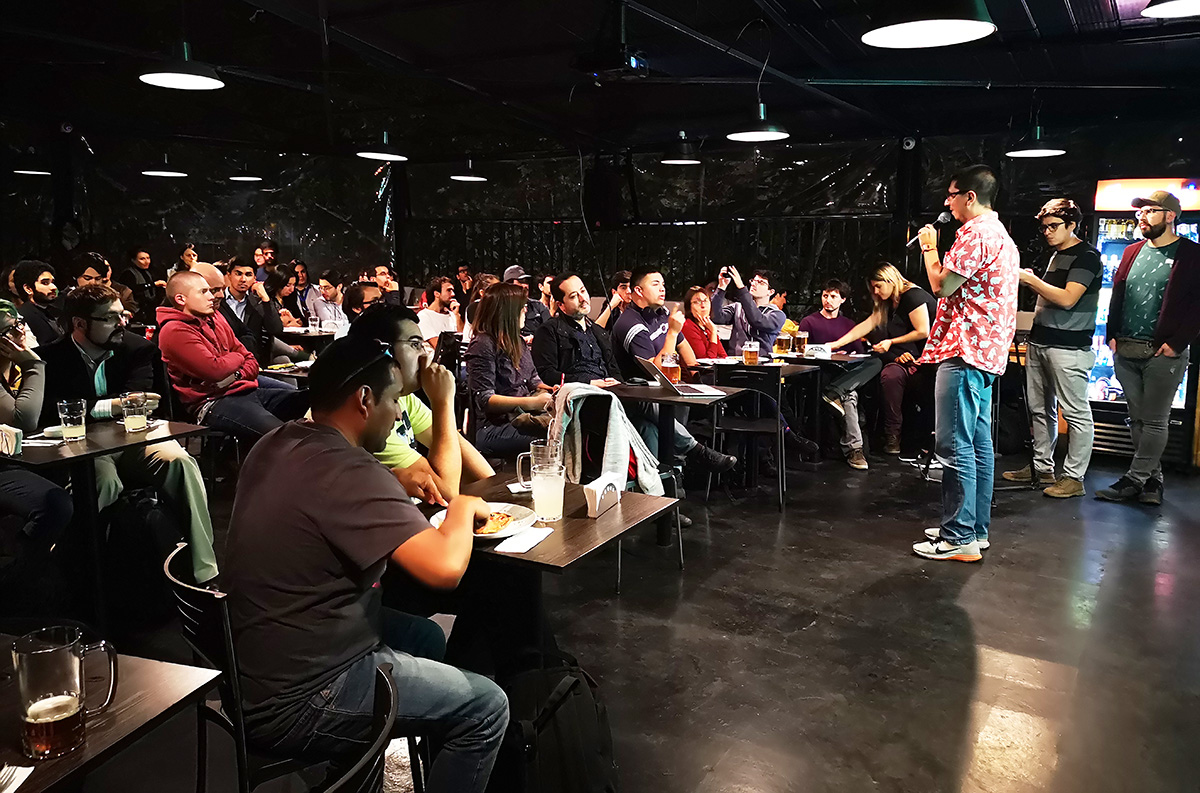Más de 100 personas asistieron a primera versión de Data, Beer & Pizza del IMFD
Datos (muchos datos), pizza y cerveza fueron los ingredientes esenciales del primer Data, Beer & Pizza, un encuentro que busca —en un ambiente relajado de camaradería— difundir los alcances de la ciencia de datos en sus más diversos campos de aplicación. El encuentro, al que asistieron más de 100 personas, fue organizado por el Instituto Milenio Fundamentos de los Datos (IMFD) con apoyo del programa Proyección al Medio Externo de la Iniciativa Científica Milenio y tuvo lugar en Galería Mackenna, en el centro de Santiago.
¿Cómo entienden los computadores a los seres humanos? ¿Cómo se manifiesta el troleo a través de las redes sociales y con qué tipo de temas surge más? ¿Son los computadores todopoderosos? Estos fueron los tres tópicos abordados en las charlas que dieron los investigadores del IMFD Jorge Pérez, Magdalena Saldaña y Marcelo Arenas, respectivamente, en la primera versión de este evento realizado el pasado 16 de abril de 2019.
¿Cómo nos entienden los computadores?
Jorge Pérez, investigador asociado del IMFD y académico del Departamento de Ciencias de la Computación (DCC), de la U. de Chile, fue el encargado de abrir la jornada con una lúdica charla donde explicó cómo se entrena a un sistema computacional para que aprenda a unir conceptos y armar frases como las que utilizamos a diario en sociedad, utilizando aquello que creemos único y distintivo del ser humano: el lenguaje natural.

A través de ejemplos, el investigador fue explicando cómo los computadores, al aprender a construir frases utilizando la información generada por el ser humano, reproducen —sin entender su sentido— los mismos sesgos que la sociedad tiene en torno a diversos conceptos. Tal como recogió el medio electrónico Emol, Pérez mostró el entrenamiento de una inteligencia artificial «a través de un trabajo con vectores y análisis de palabras que fueron enseñadas a un sistema, extraídas de los artículos publicados en Wikipedia”, consigna la publicación.
Durante el ejercicio, en el que Jorge Pérez programó “en vivo” frente a los asistentes, se iba mostrando cómo el computador asociaba palabras relacionadas a género o política, por ejemplo, con ciertos adjetivos, reflejando un posible sesgo de la máquina, adquirido en su proceso de aprendizaje. “Una misión para los científicos es evitar enseñarles a las máquinas los sesgos”, dijo Jorge Pérez en la charla, “luego de mostrar, con ejemplos, cómo algunas palabras se contextualizaban según los textos en los que se encontraban para dar como resultado relaciones que claramente tenían problemas de discriminación”, señala Emol.
Chilenos y troleo en redes sociales
Magdalena Saldaña, académica de la Facultad de Comunicaciones de la UC e investigadora del IMFD, abordó la incivilidad en redes sociales —el concepto académico para referirse a troleo— en su charla «Haters gonna hate».
La investigadora comentó que, a nivel internacional, se calcula que uno de cada cinco comentarios (esto es, 20%) cae en la categoría de incivilidad. Ahora, la situación cambia cuando se mira el despliegue de opiniones en las redes sociales de medios en Chile: en promedio, en nuestro país uno de cada cuatro comentarios cae en la categoría de incivilidad y si se trata de época de elecciones, el 30% de los posteos corresponden a aquello que claramente se distingue como «troleo».
“La importancia radica en que los comentarios inciviles tienen un efecto en las audiencias: las personas se vuelven más intolerantes, decae la credibilidad de los medios e, incluso, afecta la percepción que se tiene de las noticias”, agrega la investigadora del IMFD. Con esto apuntó a que, mientras más comentarios inciviles hay en una noticia, las personas tienden a valorar la información como negativa, sin haberla leído.
Son los computadores todopoderosos
El encargado de cerrar la jornada fue Marcelo Arenas, director del IMFD. Con su charla llamada «¿Son los computadores todopoderosos?», el profesor titular del Departamento de Ciencias de la Computación (DCC) de la Universidad Católica, rebatió la creencia de que los computadores ha alcanzado una capacidad de procesamiento para la cual ya no hay límites.
El investigador explicó que, si bien en algunos aspectos los computadores pueden estar superando a los seres humanos, eso no los hace ni todopoderosos, ni infalibles. En su exposición afirmó que existen límites físicos en las capacidades de los computadores, impuestos por el hardware.
Para demostrarlo, utilizó algunos ejemplos de problemas de lógica computacional cuya solución, de ser procesada por los computadores más poderosos que pudiésemos imaginar, tardaría en ser procesada más tiempo del que ha existido el universo. «Y eso es algo que debemos agradecer, ya que si un computador pudiese resolver algunos de estos problemas, todo lo que la ciencia ha desarrollado en materia de criptografía y que es clave para la seguridad de las transacciones financieras en línea sería inútil», concluyó Arenas.
Data, Beer & Pizza forma parte de una serie de charlas de divulgación científica orientadas al público general, que se realizarán durante 2019 y que serán comunicadas a través del sitio del IMFD y en sus redes sociales.
